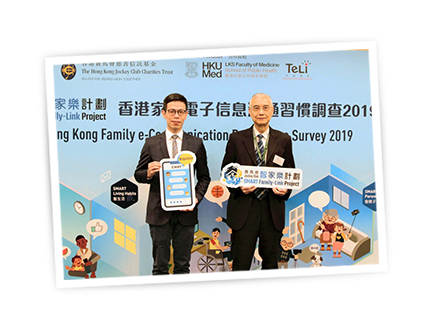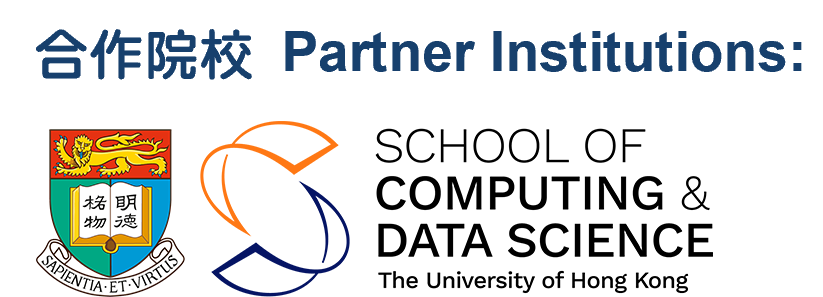
Media Events
Press Conference on the result announcement of ‘Hong Kong Family e-Communication Behaviours Survey 2019’ (19th December 2019)

Hong Kong Family e-Communication Behaviours Survey 2019
‘The wiser the use of ICT in communications, the better the family well-being,’ HKU survey revealed.
“Jockey Club SMART Family-Link Project” promotes family interaction through SMART Communication
Busy schedules and long working hours have often hindered the communications between Hong Kong parents and their children, with some even not talking to each other on a daily basis. As society changes, more and more young adults no longer live with their parents in order to make a living; the number of elderly living alone or with their spouse has risen by more than 60% in the past decade, leading to worsened communication and distant family relationships. In view of the situation, the Jockey Club SMART Family-Link Project team conducted an online survey on “Hong Kong Family e-Communication Behaviours” in Q2 2019. The survey results were announced at the press conference on 19th December 2019 and the aim of the event were to understand the behaviours and quality of communication in Hong Kong families and how family members interact with each other.
Initiated and funded by The Hong Kong Jockey Club Charities Trust, in collaboration with the School of Public Health and the Technology-Enriched Learning Initiative of The University of Hong Kong (“HKU”) and non-governmental organisations, the Project aims to encourage the wise use of Information Communications Technology (ICT) in promoting family well-being. Through this territory-wide survey, the Project team hopes to learn more about Hong Kong’s family communication behaviours via ICT, from which individuals could share their happiness.
The survey results were announced at today’s press conference with Professor Lam Tai-hing, BBS, JP, Principal Investigator of the Jockey Club SMART Family-Link Project and Sir Robert Kotewall Professor in Public Health, Chair Professor of Community Medicine of School of Public Health, Li Ka Shing Faculty of Medicine, HKU; and Dr. Kelvin Wang Man Ping, Co-Investigator of the Jockey Club SMART Family-Link Project, Associate Professor, School of Nursing, Li Ka Shing Faulty of Medicine, HKU. The speakers presented the trends and behaviorial habits of family communications nowadays, and shared with us practical tips on how e-chat groups help enhance family relationships.
The Hong Kong Jockey Club Charities Trust has long been supporting community groups to organise different projects that help promote family well-being. Among them, the ‘Jockey Club SMART Family-Link Project’, launched last year, aims to advance the use of ICT in family services. Through cross-sectoral collaboration, a service management system was developed to reduce the administrative workload of family service centres, while innovative and evidence-based service models were developed for early identification of at-risk cases to enable early preventive and remedial services.
Summary of Survey
- Face-to-face communication (74%) and digital text messaging (53%) were the most commonly adopted family communication methods. In comparison to data in 2013, there is a surge in text messaging, while a downward trend for face-to-face communication.
- 74% of respondents had family e-chat groups – Comparing with those without a family e-chat group, the former respondents received greater scores in terms of the quality of family communication as well as personal and family happiness, scoring 7.0, 6.6 and 6.8 points respectively.
- Respondents from the younger age groups (18 – 24 years old and 25 – 44 years old) were associated with a lower frequency of using family e-chat groups.
- Sending and receiving messages in family e-chat groups cast a positive influence on the quality of family communication, as well as personal and family happiness.
- To allow the sending and receiving of messages in family e-chat groups to maximize its benefits, it is recommended that sending excessive messages should be avoided.
Project’s Co-Investigator Dr. Kelvin Wang Man Ping indicated that face-to-face communication has seen a decline as with the changing social living behaviours, while the communication with family using e-chat groups has become more prominent and widely adopted. At the same time, using e-chat group as a communication media is boosting both the quality of family communication, and the level of personal and family happiness. ICT is playing a more and more critical role in the mainstream communication model among members of the public.
Project’s Principal Investigator Professor Lam Tai-hing conveyed that SMART communications with family members will contribute to better family well-being. “Learning positive and proactive communication strategies will be particularly helpful,” said Lam. He shared that “Positive Family Psychology” includes five domains that family members should observe, “Sharing Joy”, “Being Devoted”, “Showing Gratitude”, “Savouring Life” and “Staying Healthy”. These five elements would shape family behaviour and attitude, by encouraging members of the public to communicate more positively and sharing more joyful emotions in everyday conversations. As such, family members will feel supported in times of adversity, and being able to tackle various challenges sensibly.
Professor Lam also provided some tips on family communications with the help of ICT. For example, users are encouraged to include photos and short videos as the vacuum of communications, or to create e-stickers using family photos and apply them in daily conversations in e-chat groups, in order to make the chats more visual and fun. In addition, it is also essential to avoid sending many text messages in a row, which could possibly result in disturbance and pressure on the receivers’ side.
ICT to take over communication trends; implementation of five SMART themes – promoting wise and SMART means in handling family relationships
The survey results revealed that electronic communication has becomes the trend in family communication, hence the importanmce of SMART communication with family members. The Jockey Club SMART Family-Link Project team encourages families to leverage ICT for improving family communications and promoting family well-being. The Project team will develop ICT tools and promote the wider use of electronic messages, instead of lengthy text, for better family interactions. It also advocates the five SMART themes: “SMART Communication”, “SMART Coping”, “SMART Parenting”, “SMART Emotion”, and “SMART Living Habits”, and through tweats in daily life such as wise use of family e-chat groups, beter emotional manegement and positve attitude in interacting with family members, family harmony could be enhanced.
– END –
Copyright © Jockey Club SMART Family-Link Project. All Rights Reserved. 版權所有





